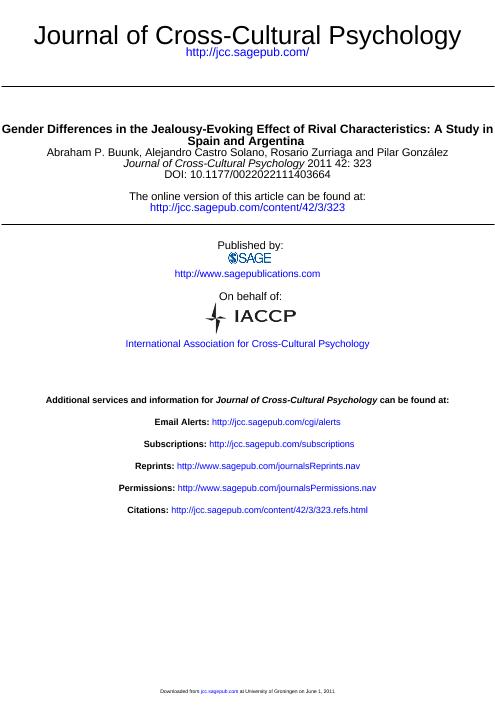Mostrar el registro sencillo del ítem
dc.contributor.author
Buunk, Abraham P.
dc.contributor.author
Castro Solano, Alejandro

dc.contributor.author
Zurriaga, Rosario
dc.contributor.author
González, Pilar
dc.date.available
2023-04-03T14:25:57Z
dc.date.issued
2011-06
dc.identifier.citation
Buunk, Abraham P.; Castro Solano, Alejandro; Zurriaga, Rosario; González, Pilar; Gender differences in the jealousy-evoking effect of rival characteristics: A study in Spain and Argentina; SAGE Publications; Journal Of Cross-cultural Psychology; 42; 3; 6-2011; 323-339
dc.identifier.issn
0022-0221
dc.identifier.uri
http://hdl.handle.net/11336/192451
dc.description.abstract
This study examines gender differences in the jealousy-evoking nature of rival characteristicsin two Spanish-speaking countries (Argentina and Spain). A total of 388 Spanish students and444 Argentinean students participated in the study. First, the cross-cultural validity of a Dutchscale containing 56 rival characteristics was examined. A factor analysis distinguished fourdimensions (i.e., social power and dominance, physical attractiveness, physical dominance, andsocial-communal attributes). After the analysis, the final scale contained in total 24 items. Resultsshowed that in Argentina and Spain combined, men experienced more jealousy than womenwhen their rival was more physically dominant. In contrast, women experienced more jealousythan men when their rival was more physically attractive, had more social-communal attributes,and had more social power and dominance. In both genders, social-communal attributes wasthe most jealousy-evoking characteristic, followed by physical attractiveness in women and bysocial power and dominance in men. In addition, in Argentinean participants but not in Spanishparticipants, those high in social comparison orientation found the rival characteristics morejealousy evoking. These results provide strong support for the evolutionary hypothesis of genderdifferences in the rival characteristics that may evoke jealousy. Small size effect differences werefound between the two countries and only regarding social-communal attributes.
dc.format
application/pdf
dc.language.iso
eng
dc.publisher
SAGE Publications

dc.rights
info:eu-repo/semantics/openAccess
dc.rights.uri
https://creativecommons.org/licenses/by-nc-sa/2.5/ar/
dc.subject
CULTURAL DIFFERENCES
dc.subject
GENDER DIFFERENCES
dc.subject
JEALOUSY
dc.subject
RIVAL CHARACTERISTICS
dc.subject
SOCIAL COMPARISON ORIENTATION
dc.subject.classification
Psicología especial

dc.subject.classification
Psicología

dc.subject.classification
CIENCIAS SOCIALES

dc.title
Gender differences in the jealousy-evoking effect of rival characteristics: A study in Spain and Argentina
dc.type
info:eu-repo/semantics/article
dc.type
info:ar-repo/semantics/artículo
dc.type
info:eu-repo/semantics/publishedVersion
dc.date.updated
2023-04-03T12:11:54Z
dc.journal.volume
42
dc.journal.number
3
dc.journal.pagination
323-339
dc.journal.pais
Reino Unido

dc.description.fil
Fil: Buunk, Abraham P.. University of Groningen; Países Bajos
dc.description.fil
Fil: Castro Solano, Alejandro. Consejo Nacional de Investigaciones Científicas y Técnicas; Argentina. Universidad de Palermo; Argentina
dc.description.fil
Fil: Zurriaga, Rosario. Universidad de Valencia; España
dc.description.fil
Fil: González, Pilar. Universidad de Valencia; España
dc.journal.title
Journal Of Cross-cultural Psychology

dc.relation.alternativeid
info:eu-repo/semantics/altIdentifier/doi/http://dx.doi.org/10.1177/0022022111403664
Archivos asociados
